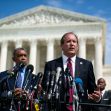A new law created in 2021 in Texas that controls moderation in social media is now legal. This new state law places major constraints upon tech platforms that moderate social media posts, such as violent images, racist rants and extremist content.
Tech giants are now strongly protesting the Texas law, saying it will lead to more dangerous extremist views and violence.
In December 2021, an Austin, Texas, federal judge stopped the law when Facebook, Google, and numerous tech platforms challenged the new law’s constitutionality. But last week, in New Orleans, the Circuit Court of Appeals overruled the lower Austin court, allowing the law to be enforced.
Now, the numerous tech groups responsible for the largest social media platforms in the world have asked the Supreme Court for an emergency ruling to block this new law.
The law makes it illegal for social media platforms to "block, ban, remove, de-platform, demonetize, de-boost, restrict, deny equal access or visibility to, or otherwise discriminate against expression."
The new bill states tech platforms perform “wrongful censorship on social media platforms” when they block violent or racist content, and also mandates that any social media platform with over fifty million users must not only publish their moderation policies but can also be sued over their decisions. The section in the law, “Censorship Prohibited,” says that social media cannot “censor a user, a user’s expression, or a user’s ability to receive the expression of another person based on the viewpoint of the user or another person.”
Texas lawmakers easily passed the new law, claiming social media platforms such as Facebook, Twitter, etc. had an “anti-conservative” bias. A year before this new social media law, in 2021, the Texas lawmakers passed a law that stops social media platforms from banning any users due to their political views.
Referring to the new law, Texas Attorney General Ken Paxton said it protects all citizens' rights and views.
“Once these businesses became 'dominant digital platforms,' they began to deny access to their services based on their customers' viewpoints," Paxton said in a court filing.
The example Paxton used as an instance of user bias by social media platforms was the Facebook ban in 2021 on users saying COVID-19 is man-made. The company later reversed the policy.
Tech social media platforms and journalists disagree with the new law, pointing to the dangers of allowing extremism and violent videos to appear on Facebook, Twitter, etc.
Only two weeks ago, a serial killer used social media to stream his massacre of ten Black victims in a Buffalo, New York, supermarket. The killer live-streamed the massacre on Twitch for two minutes before it was cut off by moderators.
Adam Kovacevich, CEO of the tech lobbying group Chamber of Progress, said the new Texas law is dangerous because it allows nefarious, violent posts to continue.
"What's clear in the wake of this tragedy is that we must be doing everything in our power to stop white supremacist ideologies like the replacement theory from further radicalizing Americans," Kovacevich said. "But that is in direct conflict with this Texas law, which explicitly prevents social media platforms from taking down user content even when it promotes racism or terrorism.”
The tech platforms are asking the Supreme Court to stop this new Texas law because it violates the First Amendment by making private companies such as social media platforms host and publish content they do not agree is acceptable content.
NetChoice, one of the companies challenging the Texas law, stated they believe it forces them to share and promote content that would never be approved by their policies.
The new law "strips private online businesses of their speech rights, forbids them from making constitutionally-protected editorial decisions, and forces them to publish and promote objectionable content," said Chris Marchese of NetChoice. “Left standing, Texas HB 20 will turn the First Amendment on its head — to violate free speech, the government need only claim to be 'protecting' it.”
Texas disagrees.
Attorney General Paxton said the new law is "designed to guarantee all Texans equal access to the 'modern public square,’” adding that social media platforms are "the twenty-first century descendants of telegraph and telephone companies,” and should be forced to adhere to government communications regulations.






